Every few years, the world rediscovers Kathryn Hahn. The cycle of Hahn’s career is an inexplicable temporal paradox of pop culture, really. She’s popped up in beloved rom-coms, made her presence felt on prestige dramas, and played the “best friend” often enough for casual TV fans and moviegoers to recognize her when she eventually steals scenes in more zeitgeisty fare like she did recently with Disney+’s streaming superhero, WandaVision.
But Hahn, like the show’s surprising villain, has been here all along, putting in the time and paying dues by making the most of each opportunity she’s been offered. Her characters live squarely in that space between comedy and drama. They’re despondent housewives who strike up friendships with sex workers. They’re quirky, heartbroken women scheming to help their friend lose a guy in just 10 days. They’re political sharks, spiritual rabbis, free-spirited single-moms, cartoonish antagonists, but they’re all memorable. So much so that, when Hahn inevitably delivers another career-making turn that gets the internet buzzing and new viewers staking a claim to her fandom, the rest of us must remind them that yes, Kathryn Hahn is that actress in that thing they loved, and yes, she was good in that too.
So, while we enjoy yet another Hahnissance, perhaps it’s time we chart the evolution of the criminally underappreciated queen of dramedy? After all, her current reign has been a long time in the making.
The Sidekick Years
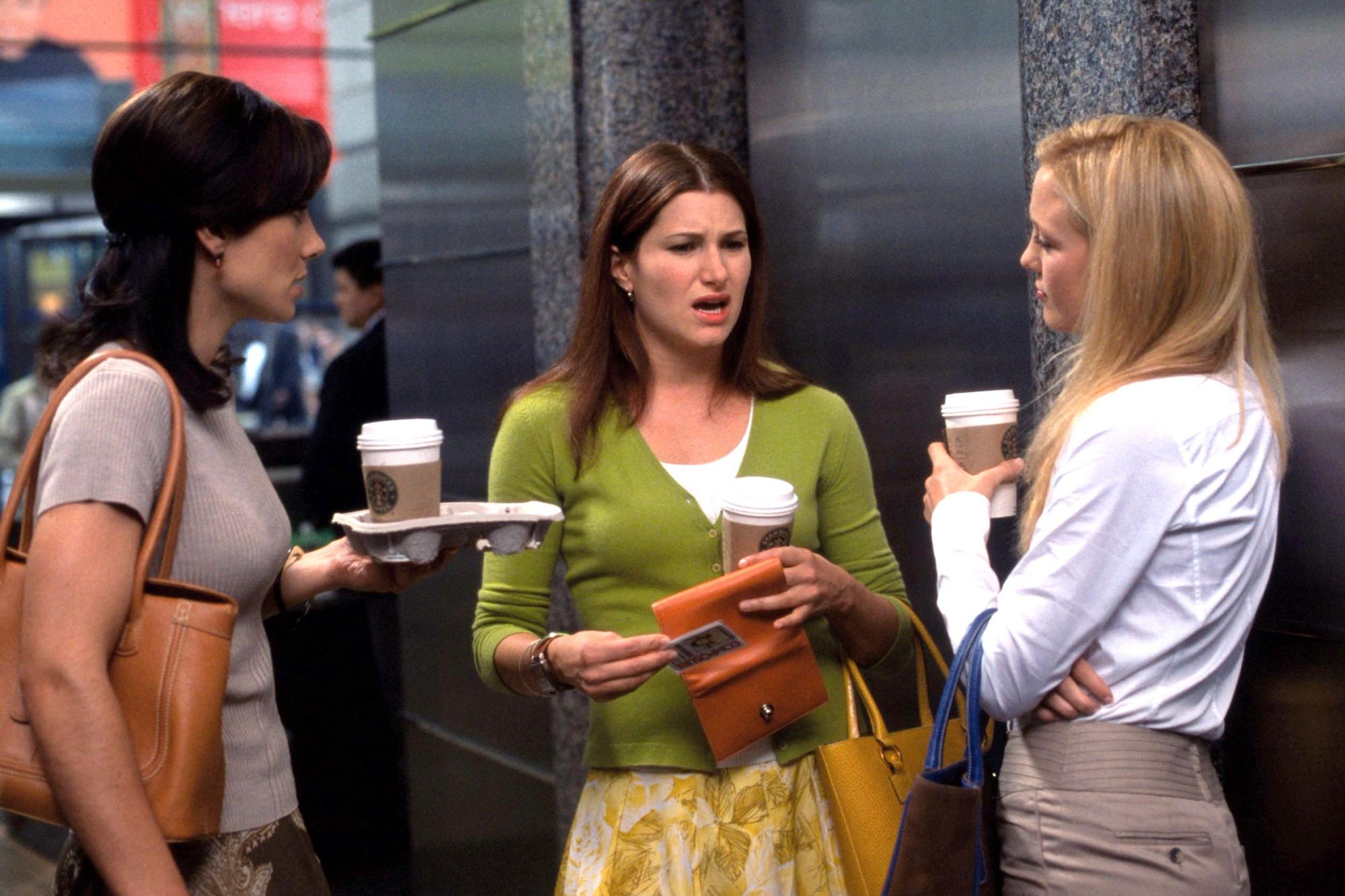
If you were a talented comedic actress coming up in the early aughts, you likely waded through plenty of “sidekick” casting calls, but Hahn made the most of the gigs she booked. Her first major on-screen appearance came thanks to the cult rom-com hit, How To Lose a Guy In 10 Days. While Kate Hudson and Matthew McConaughey played the will-they-or-won’t-they couple at the center of the film — one determined to drive her suitor away on a strict deadline, the other resolved to win her affection in order to win a work bet — Hahn was happy to steal the few scenes she was in by adding an air of painfully relatable desperation to her character’s romantic mishaps. Michelle’s misguided notions of how to land a boyfriend may have sparked Andie’s (Hudson) idea for her next column, but it was Hahn’s soft-spoken shrink cosplaying scene that garnered some of the biggest laughs.
And her ability to pull focus from some of the more outrageous comedy happening in the films that pepper the early years of her IMDb page isn’t limited to rom-coms either. In fact, two of her most impressive comedic turns happened amidst the bro-heavy comedy of Adam McKay’s breakout years. She played the best friend to Christina Applegate’s ambitious morning news anchor in Anchorman: The Legend of Ron Burgundy, but it was her repressed housewife in Step-Brothers that still manages to make an impact on comedy fans over a decade later. Stuck in a loveless marriage to Adam Scott’s acapella-loving jerk, Hahn’s Alice enjoys some forbidden fruit in the form of John C. Reilly’s stuck-at-home man-child Brennan. The two share a charged make-out scene halfway through the film (plus a Christmas-timed romp left on the cutting room floor) that showcases Hahn’s ability to deliver outrageous physical gags with the best of them.
The Guest Star Run
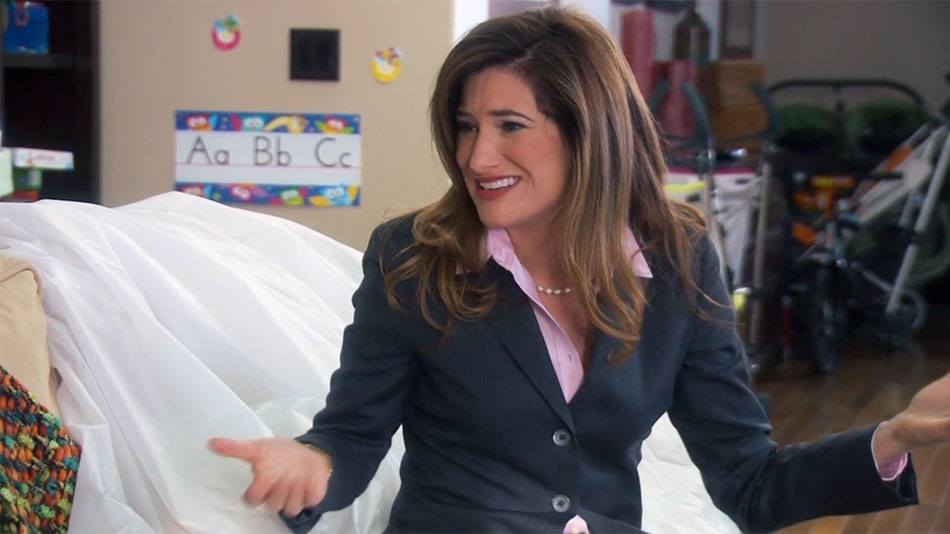
Hahn took the comedy beats she honed on the big screen and brought them to TV a few years later, guesting on sitcom hits and millennial coming-of-age dramedies and Queer-focused streaming projects that invited her to add her own stamp on the changing landscape of television. Her most popular recurring spot was, undoubtedly, her role as the uber-confident foil to Amy Poehler’s bright-eyed, small-town government employee Leslie Knope on NBC’s Parks and Recreation. Jennifer Barkley was a big-city campaign manager, swooping in from D.C. to cause chaos and threaten Knope’s chances of winning a local election, but even when she was shaking people down at J.J.’s Diner and calling vilifying Knope on Perd Hapley’s morning news program, fans couldn’t help but love her.
TV was also where Hahn got the chance to stretch her dramatic muscles, guest-starring on the first season of HBO’s hit series Girls as a working mom named Katherine who hires Jessa (Jemima Kirke) to babysit her children. Jessa is a terrible caretaker, eventually sleeping with Katherine’s husband, but despite the tired trope of the “wronged woman” the show tried to box her in with, Hahn was able to breathe a bit of nuance and likability into her short tenure, making an impact on Jessa that lasted beyond their final meeting.
And she harnessed both experiences to teeter between the inherent comedy and heavy subject matter she was tasked to carry as Rabbi Raquel Fein in Amazon’s Transparent. Hahn was nominated for an Emmy for her performance as the spiritual leader who gets entangled in the mayhem that constantly follows the Pfeifferman clan. It was here that Hahn was able to play the “anchor” amidst the show’s more humorous currents, bringing a sense of groundedness to her character’s relationships with the family and pulling off the darker comedy needed to make seder meltdowns and temple-hookups-gone-wrong feel appropriate to laugh at.
The Indie Era
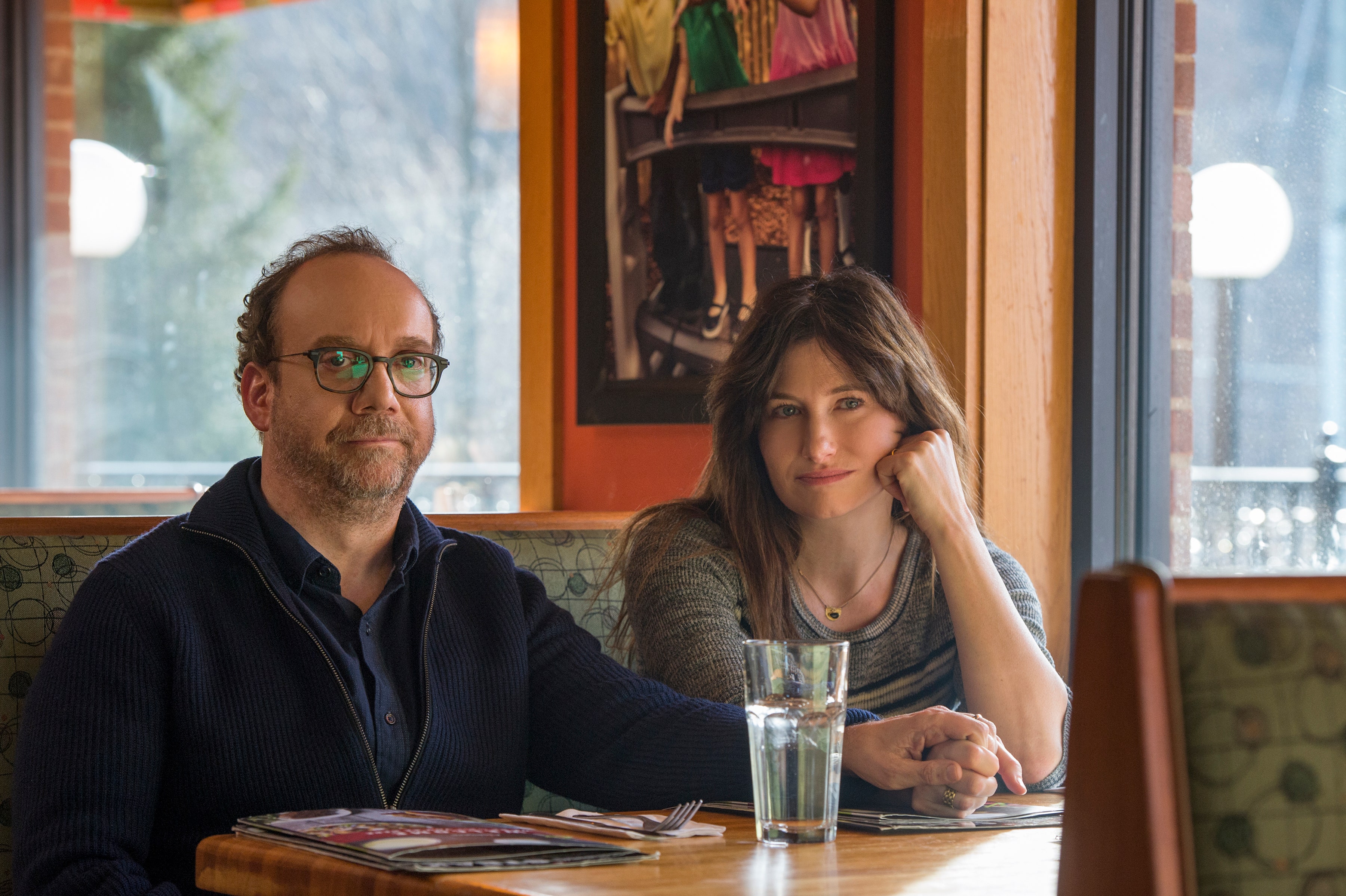
Technically, Hahn’s time on Transparent came after (and because of) her work on Joey Soloway’s Afternoon Delight but the Sundance darling feels like the gateway into Hahn’s indie work so we’ll pay homage to it here. Despite its uneven tone and storytelling missteps, the film works — mostly because Hahn is just so damn watchable. She plays a suburban housewife named Rachel who searches for ways to cope with the malaise of domestic life — a recurring theme in her later work — and ends up taking a young sex worker (Juno Temple) under her wing. Their friendship wreaks havoc on Rachel’s already floundering marriage and her strained friendships, but Hahn is so sympathetic, so awkwardly funny that you can’t help but feel for her character — even when she makes some problematic choices.
And that relatability extends to another stand-out indie performance Hahn gives in the Tamara Jenkins-directed Private Life. Playing one-half of a middle-aged couple struggling to conceive, Hahn’s Rachel masks her grief and frustration with a dry sarcasm that comes naturally to the actress. There’s a desperation and achingly authentic brokenness Hahn brings to the part that ensures the dramatic beats land, but she’s just as capable in the comedy department, playing for quieter laughs than you might expect.
The Suburban Doldrums
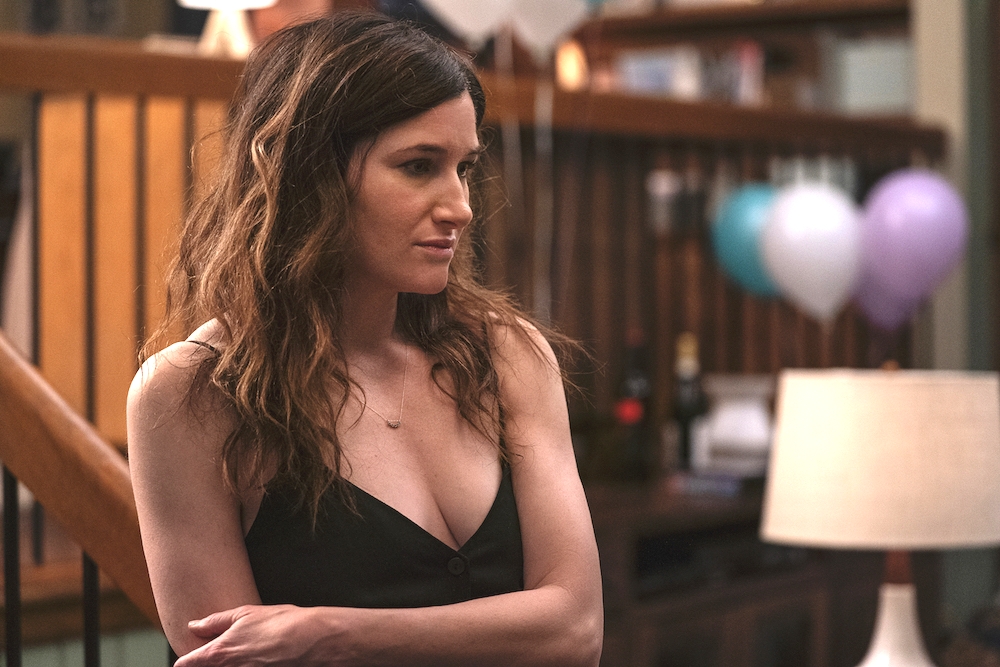
There’s a definitive shift in the kind of stories Hahn’s been telling lately, one that can be traced back to her indie days. Sure, the “suffering housewife” trope has been done to exhaustion on TV, but somehow, the actress has consistently found ways to breathe new life into that particular archetype. In fact, some of Hahn’s best work to date sees her deconstructing the myths and malcontent of TV’s most comforting staple: the suburban mom. She does it in Amazon’s I Love Dick, playing an unfulfilled artist who follows her husband to Texas and develops an unhealthy obsession with a ten-gallon hat-sporting Kevin Bacon. Hahn’s Chris makes us question our own preconceived ideas about marriage and accepted gender roles, even as we squirm over the content of her unsent letters to a man she barely knows.
And that provocative exploration of women’s sexuality only continues in the HBO dramedy Mrs. Fletcher as Hahn bares all to play a divorcee whose only son heads off to college, leaving her with plenty of time to kill. She fills it with late-night porn searches and the kind of sexual awakening you’d expect from a teenage coming-of-age rom-com but despite its incomplete ending, Hahn manages to shine. Her Eve is endearingly messy, insatiably curious, and proof of the rich storytelling that happens when the full kaleidoscope of the female experience is shown on screen. She’s funny and heartbreakingly sad at times, balancing both ends of the emotional spectrum while challenging the accepted narrative of motherhood … and what comes after it.
The Hahnissance
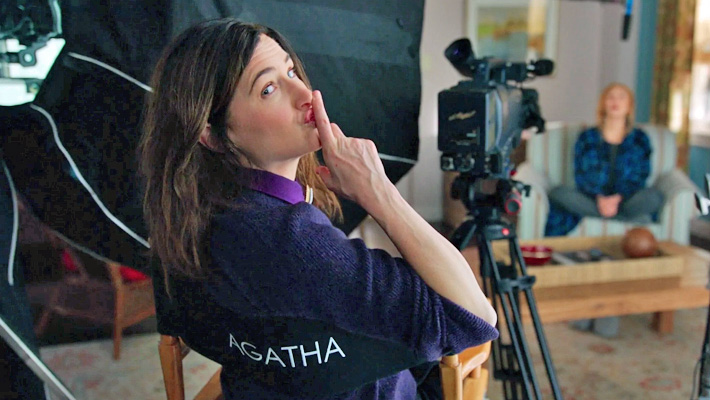
In fact, most of Hahn’s artistic trajectory is about challenging our ideas of what she’s capable of. She can do slapstick comedy alongside Will Ferrell and Steve Carell before quickly pivoting to scene-stealing guest roles on long-running comedy shows before switching things up once again to broach the more serious subject matter. She can be loud and crass and wildly funny as a Brazillian wax technician in the Bad Moms franchise before dimming that humor down to inhabit the dour, depressing setting of a Mark Ruffalo-starring limited series. She can voice fan-favorite villains in imaginative animated superhero epics and sing along in musical cartoons that double as an ode to New York City life.
At this point, no one should be surprised that Kathryn Hahn can, in fact, do it all but if you’re still wanting proof, then just look at what she did with her role in WandaVision. As Agnes/Agatha Harkness, Hahn began her run as a 50’s sitcom-esque sidekick, the nosy neighbor who pops up for some momentary comedic relief, delivering some memorable lines and gags before leaving the way she came. But over the course of the show’s 10 episodes — and its many different decades — Hahn’s Agnes morphed into the kind of brilliantly manipulative, deliciously wicked antagonist Marvel’s rarely able to deliver on. It’s not just her catchy theme-song or her iconic cackle that makes Agatha Harkness — a centuries-old witch who helps Wanda Maximoff hold an entire town hostage in order to siphon her immense power — the best part of an already-terrific series, it’s Hahn’s ability to deftly switch between over-exaggerated comedy and dramatic intrigue that adds an eerie, devious undercurrent to the story. Agnes’ villainous turn is shocking, yes, but it’s not unbelievable and that’s because Hahn managed to lay breadcrumbs in each episode, hiding them so well we only realized how damn good she was once the first season’s credits rolled.
So yes, Kathryn Hahn is the unchallenged queen of dramedy — an actress who refuses to be categorized as being good at just one thing — and she’s got decades’ worth of work to prove it. Can we stop acting surprised now?







